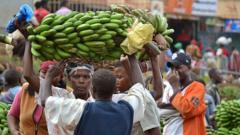An ongoing trade conflict between Tanzania and Malawi has resulted in a crackdown that has left many small traders, especially women, struggling to make ends meet as their produce is seized at the border.
**Trade Tensions Rise as Malawi-Nigeria Agricultural Ban Causes Business Struggles**

**Trade Tensions Rise as Malawi-Nigeria Agricultural Ban Causes Business Struggles**
As Tanzania enforces a ban on agricultural imports from Malawi, local traders suffer significant losses.
Amid escalating tensions in agricultural trade, Tanzania has imposed a sweeping ban on all agricultural goods crossing from Malawi and South Africa in an attempt to protect local businesses. Traders in Karonga, a Malawian town near the border, are reeling from the impact, reporting losses as they witness their perishable goods like bananas and tomatoes being seized and destroyed. Jestina Chanya, a local trader, shared her plight, stating, “My bananas were seized and destroyed. Right now, our business has brought losses, and we only have a little money left.”
The trade row intensified after Malawi restricted imports of Tanzanian products such as flour and maize in a bid to safeguard its agricultural producers. In response, Tanzania's Agriculture Minister Hussein Bashe articulated that these restrictions significantly impacted Tanzanian traders, leading to an immediate ban on agricultural imports from both Malawi and South Africa. Conversations to resolve the conflict are ongoing, even as many traders express frustration over the unfair treatment they face at the border.
As the situation unfolds, women traders, needing to sustain their families, find themselves in a precarious position. June Mwamwaja, a local trader, lamented, “The losses I have incurred are big because I can't go buy anything anymore.” The entry ban has led to a rapid decline in activity at the Kasumulu border, contrasting starkly with the usual hustle, where over 15 lorries would typically transport goods daily.
While Tanzanian traders also reported losses due to their goods being turned away at the Malawian border, many small Malawian traders voiced concerns over the lack of support and ineffective enforcement measures that seem to favor wealthier businesspeople. Evelina Mwakijungu, another trader, described how they now resort to discreetly selling restricted goods in small quantities, a meager means for survival.
The trade conflict is characterized by a complex web of protectionism and competition as Malawi increasingly becomes a viable market for Tanzanian products. It remains unclear how South Africa, which exports a variety of agricultural goods to Tanzania, will be affected by these developments. The regional tensions come at a time when African nations are supposed to be enhancing trade relations through the establishment of a continental free trade area, set up to boost economic integration across the continent.
The trade row intensified after Malawi restricted imports of Tanzanian products such as flour and maize in a bid to safeguard its agricultural producers. In response, Tanzania's Agriculture Minister Hussein Bashe articulated that these restrictions significantly impacted Tanzanian traders, leading to an immediate ban on agricultural imports from both Malawi and South Africa. Conversations to resolve the conflict are ongoing, even as many traders express frustration over the unfair treatment they face at the border.
As the situation unfolds, women traders, needing to sustain their families, find themselves in a precarious position. June Mwamwaja, a local trader, lamented, “The losses I have incurred are big because I can't go buy anything anymore.” The entry ban has led to a rapid decline in activity at the Kasumulu border, contrasting starkly with the usual hustle, where over 15 lorries would typically transport goods daily.
While Tanzanian traders also reported losses due to their goods being turned away at the Malawian border, many small Malawian traders voiced concerns over the lack of support and ineffective enforcement measures that seem to favor wealthier businesspeople. Evelina Mwakijungu, another trader, described how they now resort to discreetly selling restricted goods in small quantities, a meager means for survival.
The trade conflict is characterized by a complex web of protectionism and competition as Malawi increasingly becomes a viable market for Tanzanian products. It remains unclear how South Africa, which exports a variety of agricultural goods to Tanzania, will be affected by these developments. The regional tensions come at a time when African nations are supposed to be enhancing trade relations through the establishment of a continental free trade area, set up to boost economic integration across the continent.




















